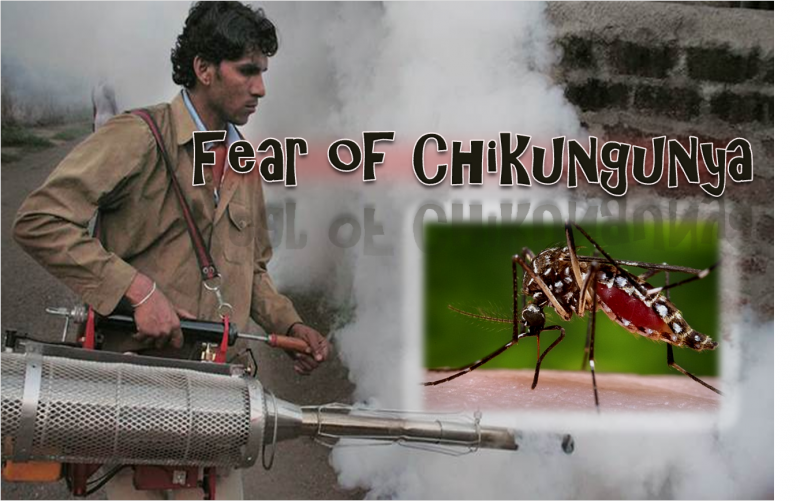
Chikungunya Outbreak!
Chikungunya outbreak has caused a lot of panic among people. Chikungunya is a virus transmitted condition for humans through the bite of an infected mosquito. Recently Delhi is gripped by Chikungunya. Many major cities in India are recorded with highest numbers of chikungunya cases. This disease is spreading throughout the world! There is no cure, vaccination, or treatment of the disease. Instead, treatment focuses on relieving symptoms.
What exactly is chikungunya?
- It is a viral disease spread by mosquitoes that bite during daylight hours
- Currently, there is no specific treatment
- No direct person-to-person transmission
- Name derives from a word meaning “to become contorted“ from the African Kimakonde language
- Symptoms include the sudden onset of fever and joint pain, particularly affecting the hands, wrists, ankles and feet. Most patients recover after a few days but in some cases the joint pain may persist for weeks, months or even longer
Major symptoms:
1) Fever: High fever usually 102 to 105 °F and typically lasts from three days up to one week.The fever can be biphasic (where it disappears for a few days followed by a few days of a low grade fever (101–102 °F). During this time, the virus accumulates in your bloodstream, spreading to different parts of the body.
2) Arthritis: Patients will usually notice arthritis pain in the small joints of hand, wrist, ankles, and larger joints, like knees and shoulders, but not the hips. Up to 70% of people have pain that spreads from one joint to the next after the previous joint starts feeling better. The pain is usually worse in the morning, but improves with mild exercise. Your joints may also look swollen or feel tender to the touch and you may have inflammation of tendons. Joint pain usually resolves within one to three weeks, with severe pain improving after the first week. However, in some cases joint pain can continue for up to a year.
3) Rash: Approximately 40% to 50% of patients experience a rash. These are red rashes with small bumps overlying them that appear three to five days after start of fever and subside within three to four days. Look in the mirror with your shirt off and note any red bumpy areas over a wide area and whether they itch. Make sure to turn around to look at your backside, back of neck, and raise your arms to examine your underarms.
The other symptoms some patients experience are:
- Myalgia (muscle/back pain)
- Headache
- Sore throat discomfort
- Abdominal pain
- Constipation
- Swollen lymph nodes in the neck
Subacute phase: This happens after 1 -3 months after the above symptom subsides. During subacute phase again there will be arthritis pain and low blood circulation for tip of hands/fingers and foot/toes. One can notice cold in the tips and it may even turn bit darker.
Chronic phase: This is after 3 months of acute phase. The joint pain will be upto 4 months to 20 months and in some cases prolongs to five years.
Treatment:
- There is no vaccine to prevent or medicine to treat chikungunya virus.
Treat the symptoms:
- Get plenty of rest.
- Drink fluids to prevent dehydration.
- Take medicine such as acetaminophen (Tylenol®) or paracetamol to reduce fever and pain.
- Do not take aspirin and other non-steroidal anti-inflammatory drugs.
- If you are taking medicine for another medical condition, talk to your healthcare provider before taking additional medication.
- If you have chikungunya, prevent mosquito bites for the first week of your illness.
- During the first week of infection, chikungunya virus can be found in the blood and passed from an infected person to a mosquito through mosquito bites.
Some suggested home treatment:
- Garlic paste application can relieve joint pain,
- Grapes can relieve severe symptoms.
- Raw carrots can boost immune system.
- Coconut water helps in preventing severe dehydration.
- A decoction or herbal tea prepared with neem powder + ginger – once or twice a day.
- Herbal tea prepared with neem powder + Ashwagandha powder + ginger
- Tulsi herbal tea
- There are several Ayurvedic medicines that are available to treat individual symptoms of Chikungunya. Consult your doctor before trying any home remedies or medicines.
References:
- http://easyayurveda.com/
- http://www.wikihow.com/
- https://www.cdc.gov/
Author: Sumana Rao | Posted on: September 23, 2016
« Ways to reduce sodium intake e-Cigarette – How Bad It Is For Children? »






















Write a comment